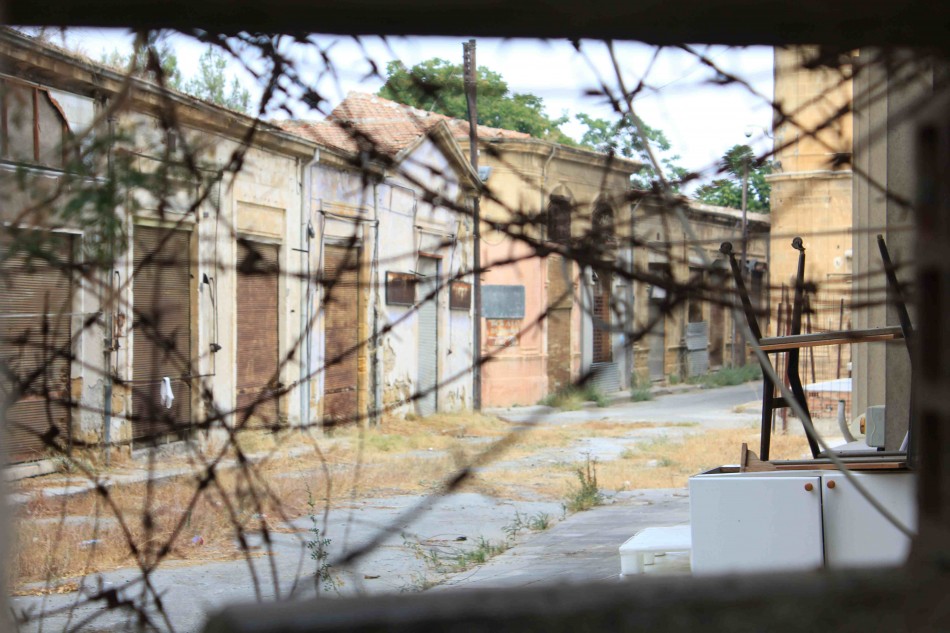Tom Andronas Producer – video | radio | print | photo+61 412 371 466
tomandronas(at)gmail.com
“Last chance for Christofias” – Neos Kosmos
 Inside the Green Line. Photo: Tom Andronas
Inside the Green Line. Photo: Tom Andronas
THOMAS ANDRONAS
A leading Turkish-Cypriot academic has challenged Greek-Cypriot President Dimitris Christofias to find a comprehensive solution to the Cyprus problem within the next 12 months, as it may be his last chance.
“If I were Christofias I would speed up the negotiations, I would try to reach an agreement within the next few months – it is do-able,” Associate Professor Ahmet Sözen of the Eastern Mediterranean University, told Neos Kosmos.
Prof Sözen’s challenge came on the back of sliding support for the Greek-Cypriot leader, whose popularity has taken a battering as a result of the explosion at a Limassol military base last month, that claimed 13 lives.
“If [Christofias] runs for presidency lets say, in February 2013, with the level of support today, he’s not going to be re-elected,” Prof Sözen said.
“For such a person, that doesn’t have any political future left, he has only [the] Cyprus problem to put his name into history in a positive sense,” he said.
According to Prof Sözen, negotiations between the Greek-Cypriot and Turkish-Cypriot leaders had made some advances in recent months, following concessions from both sides on key issues.
He said the Turkish-Cypriot side had conceded some ground on the issue of territory, while the Greek-Cypriot side made some concessions on the concept of bi-zonality in a future solution.
However a major sticking point is still the issue of property in occupied northern Cyprus.
“It’s a tough issue, I can understand that, but life does not stop,” Prof Sözen said.
“Since 1963 when the ethnic violence broke out…it’s been 48 years. Can you expect that life will stop for 48 years and nothing is going to be built on the Turkish Cypriot property?”
“Or since 1974…when both communities had to move, then I sympathise with the Greek Cypriots because they suffered more in 1974, but it’s been 37 years.”
“Can you expect that in more than one third of a century, nothing is going to happen? Life goes on…you need to build roads, you need to build hospitals, you need to build schools, you need to build homes,” he said.
However, according to Prof Sözen, some agreement has been reached between the two sides as to how the property issue will be resolved. He said three mechanisms would be used.
“The mechanisms are, number one, restitution of the property, meaning giving it back to its original owner whenever it is possible.”
“The second option is exchange of the property, meaning a Greek-Cypriot might say, ‘I don’t want my property in Kyrenia back, instead I’m going to have this Turkish-Cypriot piece of land in Larnaca’.”
“The third method is compensation, instead of getting your property, you will be compensated, you will get the money,” Prof Sözen said.
He said it was time to acknowledge the realities of Cyprus’ past.
“Let’s not pretend that nothing happened in this country, a lot of terrible things happened in this country, and both communities suffered. And if we want to live in a peaceful future, I think that both sides should learn to make compromises, and prepare their people for power sharing,” he said.
Though it is questionable whether Cypriots actually want a comprehensive Cyprus solution in which power sharing between the Greek-Cypriot and Turkish-Cypriot communities becomes the norm.
According to island-wide opinion polls conducted by Cyprus 2015, a research organization co-chaired by Prof Sözen along with Greek-Cypriot Spyros Christou, 70 per cent of Cypriots said they had lost hope that the current round of negotiations would result in a comprehensive solution.
However an equal number said they wanted some sort of comprehensive solution, which Prof Sözen said gave the two leaders legitimate reason to continue negotiations.
Though, not surprisingly, the form of the comprehensive solution desired by Cypriots, differed markedly either side of the divide.
“[When] we asked questions like ‘what type of solution do you desire?’ … the first preference of Greek-Cypriots is a unitary state where the Greek-Cypriots as the bigger community will be ruling the whole country, where the Turkish Cypriots will be a simple majority,” Prof Sözen said.
“Their second preference is a bi-zonal, bi-communal federation,” he said, in which the Greek-Cypriot and Turkish-Cypriot sides would administer their own territories, but still fall under one federal government.
“When you look at the Turkish-Cypriot side, their first preference is to have a two-state solution – two sovereign states in Cyprus – and a bi-zonal, bi-communal federation comes as their second choice,” Prof Sözen said.
“And when you ask whether a bi-zonal, bi-communal federation, on a scale is ‘highly desirable’ to ‘not desirable at all’, [the] majority of people at least find a bi-zonal, bi-communal federation tolerable or satisfactory, which is a solution that can be lived with.”
The conclusion that can be drawn from this research, according to Prof Sözen, is that if a mutually agreed solution to the Cyprus problem were to be reached, it would inevitably take the form of a bi-zonal, bi-communal federation, as this is the only option that both sides would accept.
And he says that failure to find a solution during this round of negotiations, could spell ultimate failure.
“If the current negotiations fail I think it will be perceived by everybody, by the international community, that a federation in Cyprus is not possible, so I think alternative solution models will come into picture.”
“Even a two-state solution will be a more real option if the two sides cannot agree to share power in a federal solution. So I think this seems like it is…the last chance for a federal solution in Cyprus,” Prof Sözen said.
The Greek-Cypriot government did not respond to requests for an interview.